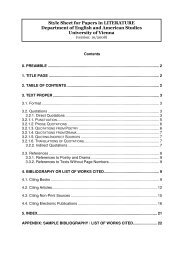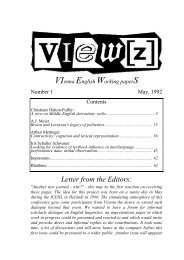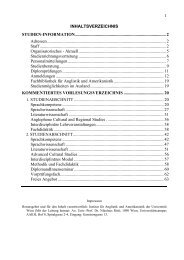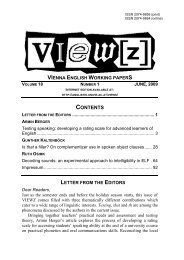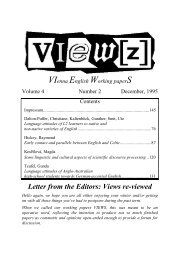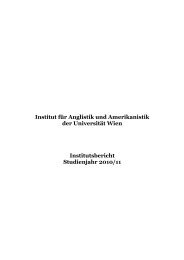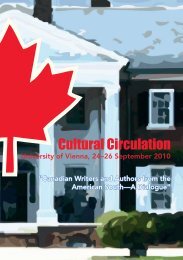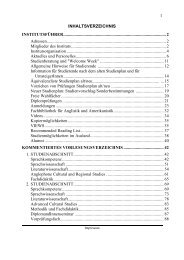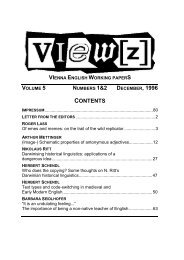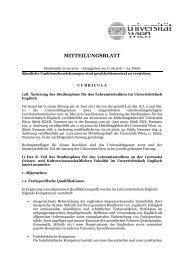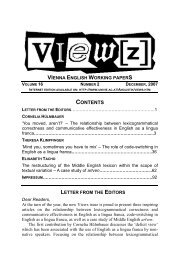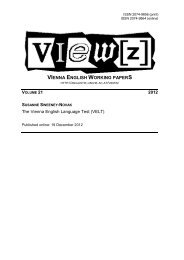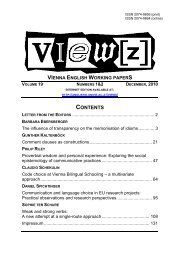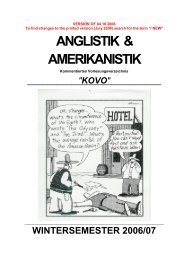1 INHALTSVERZEICHNIS STUDIEN-INFORMATION ...
1 INHALTSVERZEICHNIS STUDIEN-INFORMATION ...
1 INHALTSVERZEICHNIS STUDIEN-INFORMATION ...
You also want an ePaper? Increase the reach of your titles
YUMPU automatically turns print PDFs into web optimized ePapers that Google loves.
imposed by a lecture course of 12 units. A few prose writers will be referred to in passing (Lyly,<br />
Overbury, Nashe, Bacon, More). Methodologically the course will rely on multi-media support<br />
throughout (including Power-Point presentations, illustrations on overhead and short sequences<br />
from plays and films presented on video). – The course will be accompanied by a tutorial offered<br />
by a student tutor (for details see notice board).<br />
Requirements: Regular attendance is strongly recommended; thorough knowledge of the texts<br />
on the reading list (see notice board) and a detailed knowledge of the subject matter presented in<br />
class are vital requirements for the final exam. In addition, familiarity with chapters 3 and 4 of<br />
The Short Oxford History of English Literature by Andrew Sanders, 3 rd ed., Oxford: UOP, 2004,<br />
will be a particular asset at the final exam (self-study).<br />
303/K222: Survey of Literatures in English II<br />
Studierende, die ein positives Zeugnis über diese Lehrveranstaltung benötigen, um im<br />
DARAUF FOLGENDEN Semester ein literaturwissenschaftliches Proseminar besuchen zu<br />
können, MÜSSEN zum ersten Prüfungstermin (in der letzten Sitzung des Semesters)<br />
antreten. Aus organisatorischen Gründen können Ergebnisse aus dem zweiten<br />
Prüfungstermin NICHT BERÜCKSICHTIGT werden.<br />
2st, VO<br />
This lecture course offers an introduction to the more recent period of English literature - a<br />
phase which extends from the beginning of the eighteenth century to the present day. Individual<br />
courses will differ in structure and content but will cover a minimum period of 150 years of Eng.<br />
lit. The focus will necessarily be placed on trends, epochs and generic development; prototypical<br />
texts will be used as illustrative material. In addition to retracing the evolution of English<br />
literature, this lecture course offers a first introduction to some of the more important<br />
developments in English cultural history. Students will thus be provided with a contextualising<br />
framework which will enable them to read texts as complex responses to their respective<br />
cultural, social, historical, political, scientific, philosophical and economic environment.<br />
Students are advised to take this lecture course after having successfully completed the<br />
introductory course on the study of literatures in English.<br />
33<br />
Course:<br />
English Literature from the 18 th to the 21 st Century<br />
Margarete Rubik, Tue 11-13, Hs C1 (ab 8.3.)<br />
A lecture attempting to survey English literature from the 18 th century to the present can, of<br />
necessity, only focus on general trends, major characteristics and the most important writers of<br />
the various periods. By means of a variety of full-length texts and excerpts we will investigate<br />
how drama, narrative fiction and poetry responded to the radical changes in political and social<br />
history, science and philosophy that have profoundly remodelled our world view from the age of<br />
Enlightenment to the postmodern era. The texts on the reading list will be made accessible in a<br />
reader or from the campus bookshops. Most of them will be taken from the Norton or Oxford<br />
anthologies.In addition, the use of a literary history to read up on and supplement the material<br />
discussed in the lecture is recommended .e.g., Andrew Sanders, The Short Oxford History of<br />
English Literature (Oxford UP) or Ulrich Seeber (ed.), Englische Literaturgeschichte (Metzler).



